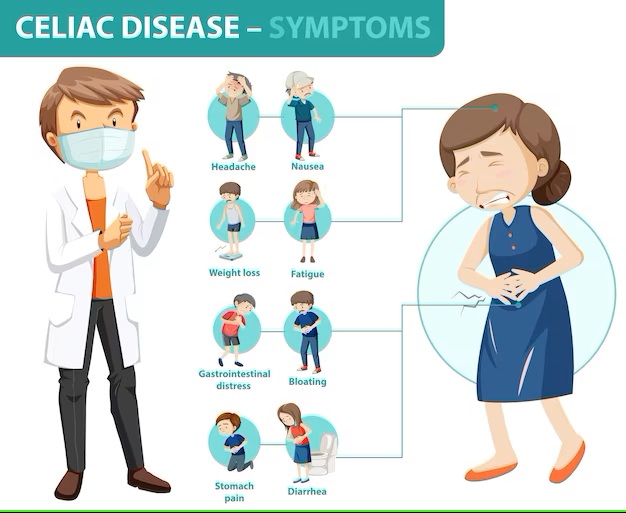
Symptoms of celiac disease
Celiac disease is an autoimmune illness caused by gluten, a protein present in wheat, barley, and rye. When persons with celiac disease consume gluten, their immune system reacts by attacking the small intestine, causing damage to the lining and resulting in a variety of symptoms. Celiac disease symptoms can vary greatly amongst persons, with some experiencing more severe symptoms than others. Celiac disease is characterized by the following symptoms:
· Gastrointestinal Symptoms:
v Abdominal pain and bloating
v Diarrhea or constipation (or alternating between the two)
v Nausea and vomiting
v Foul-smelling or fatty stools
v Heartburn or acid reflux
· Weight Loss and Poor Growth:
v Unexplained weight loss
v Failure to thrive (in children)
· Nutritional Deficiencies:
v Iron-deficiency anemla
v Vitamin and mineral deficiencies (e.g., vitamin D, vitamin B12, calcium, and more)
· Fatigue and Weakness:
v Chronic fatigue and weakness
v Feeling tired despite adequate rest
· Skin Problems:
v Dermatitis herpetiformis: Itchy, blistering skin rash affecting elbows, knees, and buttocks
· Bone and Joint Pain:
v Osteoporosis or osteopenia (bone density loss)
v Joint pain or swelling
· Mouth Ulcers:
v Painful sores inside the mouth
· Reproductive and Fertility Issues:
v Missed menstrual periods
v Infertility or recurrent miscarriages
· Neurological Symptoms:
v Numbness or tingling in the hands or feet (peripheral neuropathy)
v Balance problems and difficulty coordinating movements
It is important to note that some people with celiac disease have no visible symptoms, a condition known as \\\\\\\"silent celiac disease.\\\\\\\" Untreated celiac disease, on the other hand, can lead to long-term health issues such as malnutrition, osteoporosis, and an increased risk of certain autoimmune illnesses and cancers even if no symptoms are present.
If you suspect you have been experiencing any of these symptoms, you should see a doctor for comprehensive diagnosis and testing. Celiac disease is diagnosed with blood tests that look for certain antibodies and, if necessary, an endoscopy that examines the small intestine and confirms the existence of damage. If celiac disease is identified, the only known therapy is a gluten-free diet, which must be followed religiously.

Comments